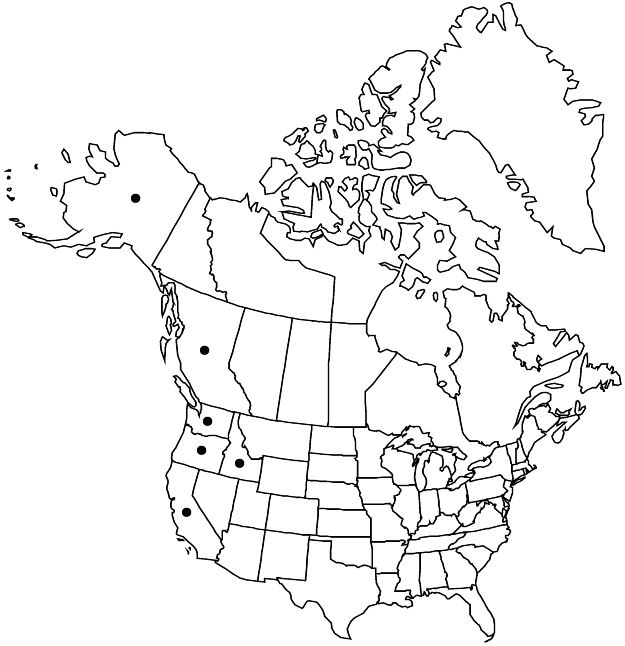Difference between revisions of "Arceuthobium campylopodum subsp. tsugense"
Phytoneuron 2012-51: 10. 2012.
FNA>Volume Importer |
imported>Volume Importer |
||
| (6 intermediate revisions by 2 users not shown) | |||
| Line 12: | Line 12: | ||
|label=Endemic | |label=Endemic | ||
}} | }} | ||
| − | |basionyms={{Treatment/ID/ | + | |basionyms={{Treatment/ID/Basionym |
|name=Razoumofskya tsugensis | |name=Razoumofskya tsugensis | ||
|authority=Rosendahl | |authority=Rosendahl | ||
| + | |rank=species | ||
| + | |publication_title=Minnesota Bot. Stud. | ||
| + | |publication_place=3: 272, plates 27, 28. 1903 | ||
}} | }} | ||
|synonyms={{Treatment/ID/Synonym | |synonyms={{Treatment/ID/Synonym | ||
|name=Arceuthobium tsugense | |name=Arceuthobium tsugense | ||
|authority=(Rosendahl) G. N. Jones | |authority=(Rosendahl) G. N. Jones | ||
| − | }}{{Treatment/ID/Synonym | + | |rank=species |
| + | }} {{Treatment/ID/Synonym | ||
|name=A. tsugense subsp. amabilae | |name=A. tsugense subsp. amabilae | ||
|authority=Mathiasen & C. M. Daugherty | |authority=Mathiasen & C. M. Daugherty | ||
| − | }}{{Treatment/ID/Synonym | + | |rank=subspecies |
| + | }} {{Treatment/ID/Synonym | ||
|name=A. tsugense subsp. contortae | |name=A. tsugense subsp. contortae | ||
|authority=Wass & Mathiasen | |authority=Wass & Mathiasen | ||
| − | }}{{Treatment/ID/Synonym | + | |rank=subspecies |
| + | }} {{Treatment/ID/Synonym | ||
|name=A. tsugense subsp. mertensianae | |name=A. tsugense subsp. mertensianae | ||
|authority=Hawksworth & Nickrent | |authority=Hawksworth & Nickrent | ||
| + | |rank=subspecies | ||
}} | }} | ||
|hierarchy=Viscaceae;Arceuthobium;Arceuthobium campylopodum;Arceuthobium campylopodum subsp. tsugense | |hierarchy=Viscaceae;Arceuthobium;Arceuthobium campylopodum;Arceuthobium campylopodum subsp. tsugense | ||
| Line 44: | Line 51: | ||
|distribution=B.C.;Alaska;Calif.;Idaho;Oreg.;Wash. | |distribution=B.C.;Alaska;Calif.;Idaho;Oreg.;Wash. | ||
|discussion=<p>Meiosis occurs in July, with fruits maturing 12 to 13 months after pollination.</p><!-- | |discussion=<p>Meiosis occurs in July, with fruits maturing 12 to 13 months after pollination.</p><!-- | ||
| − | --><p>Subspecies tsugense has the broadest host range among all subspecies of Arceuthobium campylopodum. F. G. Hawksworth and D. Wiens (1996) considered subsp. tsugense to be a distinct species with two subspecies, subspp. tsugense and mertensianae. Two additional subspecies have been named: subsp. amabilae and subsp. contortae. Although the authors of these subspecies presented evidence of quantitative character variation and differences in phenology and host preferences, all variants are here considered host races of subsp. tsugense (and could be treated taxonomically as forms if so desired). The principal hosts of subsp. tsugense are Abies amabilis, A. lasiocarpa, A. procera, Pinus contorta, Tsuga heterophylla, and T. mertensiana. Secondary to rare hosts include Abies grandis, Picea breweriana, Picea engelmannii, Picea sitchensis, Pinus albicaulis, Pinus monticola, and Pseudotsuga mertensiana.</p> | + | --><p>Subspecies tsugense has the broadest host range among all subspecies of <i>Arceuthobium campylopodum</i>. F. G. Hawksworth and D. Wiens (1996) considered <i></i>subsp.<i> tsugense</i> to be a distinct species with two subspecies, subspp. tsugense and mertensianae. Two additional subspecies have been named: subsp. amabilae and subsp. contortae. Although the authors of these subspecies presented evidence of quantitative character variation and differences in phenology and host preferences, all variants are here considered host races of <i></i>subsp.<i> tsugense</i> (and could be treated taxonomically as forms if so desired). The principal hosts of <i></i>subsp.<i> tsugense</i> are <i>Abies amabilis</i>, <i>A. lasiocarpa</i>, <i>A. procera</i>, <i>Pinus contorta</i>, <i>Tsuga heterophylla</i>, and <i>T. mertensiana</i>. Secondary to rare hosts include <i>Abies grandis</i>, <i>Picea breweriana</i>, <i>Picea engelmannii</i>, <i>Picea sitchensis</i>, <i>Pinus albicaulis</i>, <i>Pinus monticola</i>, and <i>Pseudotsuga</i> mertensiana.</p> |
|tables= | |tables= | ||
|references= | |references= | ||
| Line 53: | Line 60: | ||
-->{{#Taxon: | -->{{#Taxon: | ||
name=Arceuthobium campylopodum subsp. tsugense | name=Arceuthobium campylopodum subsp. tsugense | ||
| − | |||
|authority=(Rosendahl) Nickrent | |authority=(Rosendahl) Nickrent | ||
|rank=subspecies | |rank=subspecies | ||
| Line 68: | Line 74: | ||
|publication year=2012 | |publication year=2012 | ||
|special status=Endemic | |special status=Endemic | ||
| − | |source xml=https:// | + | |source xml=https://bitbucket.org/aafc-mbb/fna-data-curation/src/2e0870ddd59836b60bcf96646a41e87ea5a5943a/coarse_grained_fna_xml/V12/V12_1060.xml |
|genus=Arceuthobium | |genus=Arceuthobium | ||
|species=Arceuthobium campylopodum | |species=Arceuthobium campylopodum | ||
Latest revision as of 20:13, 5 November 2020
Stems yellow, green, olive green, or purple, 5–7(–13) cm; third internode 4–9.2(–16) × 1–1.5(–2) mm, dominant shoot 1.5–4 mm diam. at base. Staminate flowers 2.8 mm diam.; petals 3 or 4. Fruits 3 × 3 mm.
Phenology: Flowering Jul–Sep(–Oct); fruiting (Aug–)Sep–Nov.
Habitat: Coniferous forests.
Elevation: 0–2500 m.
Distribution

B.C., Alaska, Calif., Idaho, Oreg., Wash.
Discussion
Meiosis occurs in July, with fruits maturing 12 to 13 months after pollination.
Subspecies tsugense has the broadest host range among all subspecies of Arceuthobium campylopodum. F. G. Hawksworth and D. Wiens (1996) considered subsp. tsugense to be a distinct species with two subspecies, subspp. tsugense and mertensianae. Two additional subspecies have been named: subsp. amabilae and subsp. contortae. Although the authors of these subspecies presented evidence of quantitative character variation and differences in phenology and host preferences, all variants are here considered host races of subsp. tsugense (and could be treated taxonomically as forms if so desired). The principal hosts of subsp. tsugense are Abies amabilis, A. lasiocarpa, A. procera, Pinus contorta, Tsuga heterophylla, and T. mertensiana. Secondary to rare hosts include Abies grandis, Picea breweriana, Picea engelmannii, Picea sitchensis, Pinus albicaulis, Pinus monticola, and Pseudotsuga mertensiana.
Selected References
None.